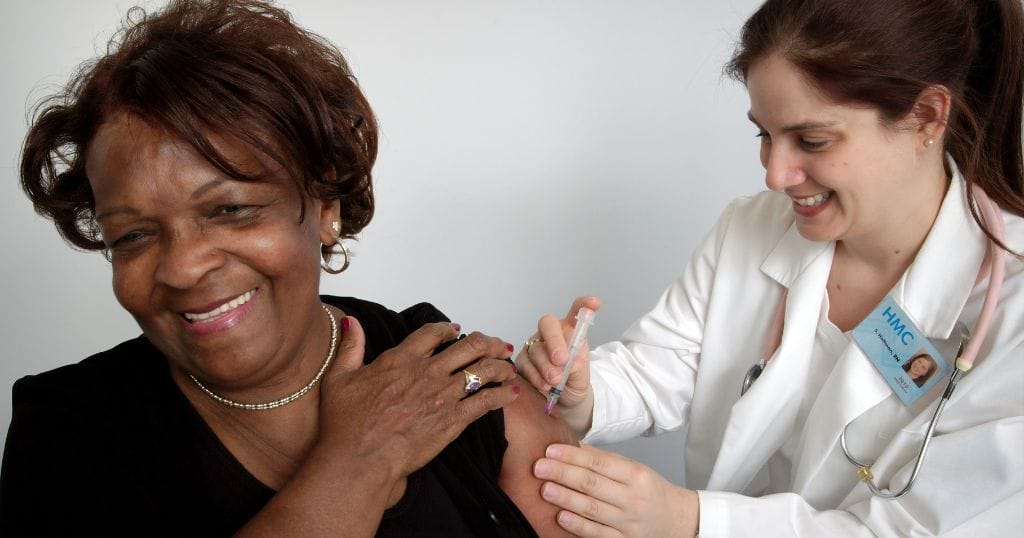The CDC and ACIP recommend a higher-dose flu vaccine for people 65 and older.
As we enter fall, the emails from your workplace or pharmacy may start to pop up in your inbox.
“It’s time for a flu shot!”
But how early is too early to get the yearly jab?
It depends, says Jason Kole, MD, director of Emergency Department Services at OSF HealthCare in Danville, Illinois.
Dr. Kole says every influenza season is different. When will it peak? What will be the dominant strain of the virus? How effective will the flu vaccine be against that strain? Plus, Dr. Kole says, health care providers are still devoting time to treating COVID-19 patients.
“If [the vaccine] actually hits the strain of flu that’s prevalent during that season, then the flu season’s going to be relatively mild,” Dr. Kole says. “If it doesn’t hit that strain, then we’re going to have a heavy flu season.”
“We’re all going to have to stay on our toes and make sure we’re well prepared,” Dr. Kole adds of the upcoming flu season.
Dr. Kole recommends taking the month of September to talk to your health care provider about the flu shot and other vaccines.
Questions to ask: Which vaccines and how many doses are recommended for me? Should I have concerns about side effects or other issues? Are there special circumstances to consider if I’m pregnant? Are there special circumstances for my child? My elderly parent?
Then by October, you’re ready to make an appointment to roll up your sleeve.
Immunizations like the flu shot are an important tool for everyone to stay healthy. But for seniors and people with underlying health conditions, Dr. Kole stresses that they need to be a priority.
“For the most part, when [the emergency department sees] someone come in with flu, we’re looking at a patient that’s older. We’re concerned about the complications of the flu developing into pneumonia or another serious illness,” Dr. Kole says.
Some misconceptions on the flu shot:
“I made it to January without getting the bug. I can skip the flu shot this year.”
Dr. Kole says you should still talk to your health care provider about the shot.
“We have seen [flu season] come in January or February,” Dr. Kole says. “Sometimes it’s late. It doesn’t necessarily have to be coming in October, November or December.”
“I got the flu shot last year, so I’m still good for this year.”
This one elicits a smile and a shake of the head from Dr. Kole.
“Every year, the flu is different,” Dr. Kole repeats. “The vaccines are designed to attack that particular [year’s] flu strain. So it’s key that you get [the flu vaccine] every year.”
“I didn’t have any side effects after my flu shot, so it must not be working.”
Like the COVID vaccine, flu shot recipients may experience a headache, muscle aches, nausea or other minor symptoms. Those are a sign the vaccine is working, Dr. Kole says. But not having side effects doesn’t mean the immunization isn’t effective.
“I need a flu shot and a COVID booster, but I don’t have time for two appointments.”
Research has shown it’s safe to get both at once.
“I got the flu shot but still got sick later that day.”
Dr. Kole says once you get the flu vaccine, you have some level of immune system response fairly quickly. But it takes a few days for you to build up a more robust immunity that, hopefully, prevents a trip to the emergency department.
“Once you’re vaccinated, you can be confident that you’re not going to get seriously ill,” Dr. Kole says.
A special note for seniors
For people 65 and older who may be more at risk for serious flu complications, the Centers for Disease Control and Prevention (CDC) and the Advisory Committee on Immunization Practices (ACIP) recommend a higher-dose vaccine. Data suggest, for that age group, these vaccines are possibly more effective than the standard dose.
The CDC also says a higher-dose flu vaccine may cause more of the temporary, mild side effects associated with flu shots. Those include pain, redness or swelling at the injection site, headache, muscle ache and malaise. The CDC says these side effects typically resolve in one to three days.
The CDC says if a higher-dose flu vaccine is not available, a senior should get a standard-dose jab, as opposed to no vaccine at all. The agency says seniors should get a shot in the arm, not a nasal spray vaccine.
More information on flu shots for seniors can be found on the CDC website:
Flu & People 65 Years and Older
Fluzone High-Dose Seasonal Influenza Vaccine
Learn more about influenza on the OSF HealthCare and CDC websites. When you’re ready to get vaccinated, contact your primary care provider, local pharmacy or local public health department to see about vaccine availability.
This article originally appeared on OSF HealthCare.






